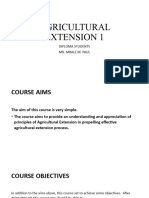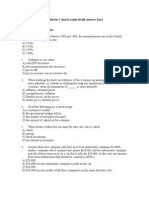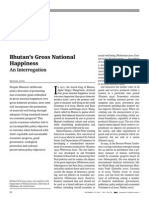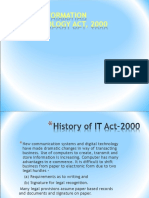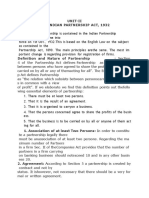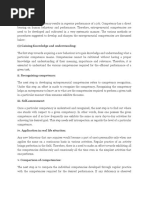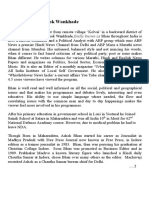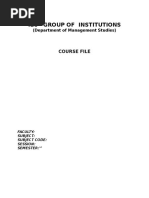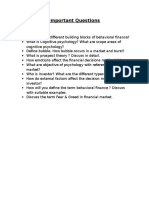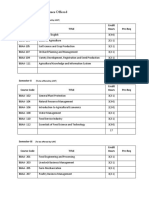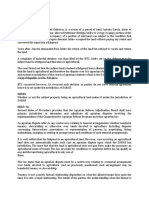0 ratings0% found this document useful (0 votes)
902 viewsRural Development Syllabus
This document outlines the objectives and units of study for a 40-hour course on rural development. The course aims to provide conceptual understanding of rural marketing and development practices in India. It covers topics such as rural business features, rural resources, production systems, managing cooperatives, economic theories related to cooperatives, approaches to rural development, and the role of institutions in rural development. Suggested readings on related topics are also provided.
Uploaded by
trustme77Copyright
© © All Rights Reserved
Available Formats
Download as DOCX, PDF, TXT or read online on Scribd
0 ratings0% found this document useful (0 votes)
902 viewsRural Development Syllabus
This document outlines the objectives and units of study for a 40-hour course on rural development. The course aims to provide conceptual understanding of rural marketing and development practices in India. It covers topics such as rural business features, rural resources, production systems, managing cooperatives, economic theories related to cooperatives, approaches to rural development, and the role of institutions in rural development. Suggested readings on related topics are also provided.
Uploaded by
trustme77Copyright
© © All Rights Reserved
Available Formats
Download as DOCX, PDF, TXT or read online on Scribd
You are on page 1/ 2
NMBA 033: RURAL DEVELOPMENT
Hours : 40
Max.
Course Objective The objective of the course is to familiarize the
participants with conceptual understanding of Rural Marketing and
development practices in Indian context.
Unit I (08 Sessions) Rural Business and its critical features; Identification of
needs of rural producer organization, enterprises, projects and its people; the
rural social and political scenario. Features of structure dynamics and
changes of rural society and polity in India in post-independence period.
Unit II (10 Sessions) Overview of the rural resources-land, soil, climate,
water and forests; Overview of the production system containing agriculture,
horticulture, seri-culture, forestry, animal husbandry and dairying, fisheries,
non-farm activities. Concept, processes and relationship among agro climate
and natural resources, production system and livelihood of rural people.
Unit III (08 Sessions) Managing co-operatives, emergence, endurance and
growth of co-operatives; Leadership issues in co- operatives, evolution of cooperative technologies; Co-operative principles; Issues in establishing
agricultural co-operatives, democratic governance in co-operatives; cooperative principles and economic rationality; Anand pattern of co-operativefederal structure, causes of sickness, leadership issues and managing
boards.
Unit IV (06 Sessions) Economic Theory of co-operatives, agency theory,
theory of contracts, transaction cost economics, game theory and their
reciprocity, welfare economics and their co-operatives.
Unit V (08 Sessions) Concept, measures and determinants of rural
development; Critique of major rural development approach and strategies;
growth vs equity oriented approach; area vs group based approach; top
down vs participatory and people oriented approach to development
planning; Contemporary growth and poverty alleviation programme; different
interventions for rural social and infrastructure development; Role of
Institutions in rural development-PRIs, NGOs etc; success and sustainability
of rural development interventions, MNREGA
Suggested Reading
1. Jonathan Reuvid, Guide to Rural Business (Kogan Page)
2. Deu S. Mahendra and Basu K.S. - Economic and Social Development
(Academic Foundation)
3. Brown Ben, Practical Accounting for Farm and Rural Business (Lavoisier)
2003.
4. Warren M - Financial Management for Farmers and Rural Managers
(Blackwell Publishing)
You might also like
- Chapter Two - Institutions For Rural DevelopmentNo ratings yetChapter Two - Institutions For Rural Development45 pages
- Identification and Management of Weeds Associated With VegetablesNo ratings yetIdentification and Management of Weeds Associated With Vegetables58 pages
- Chapter Four Strategies and Policies of Agricultural and Rural DevelopmentNo ratings yetChapter Four Strategies and Policies of Agricultural and Rural Development21 pages
- The Evolution, Function and Challenges of Agriculture Extension Services in UgandaNo ratings yetThe Evolution, Function and Challenges of Agriculture Extension Services in Uganda30 pages
- Group 9 Political Aspect of Self and Being FilipinoNo ratings yetGroup 9 Political Aspect of Self and Being Filipino38 pages
- Agri - II - Sem - Introduction To Agriculture ExtensionNo ratings yetAgri - II - Sem - Introduction To Agriculture Extension6 pages
- Criteria For Evaluating Policy and Policy ProcesNo ratings yetCriteria For Evaluating Policy and Policy Proces12 pages
- Module 1agricultural - Entrepreneurship-PresentationNo ratings yetModule 1agricultural - Entrepreneurship-Presentation88 pages
- Basic Concepts in Methods in Agricultural Research: Albert P. Ulac Instructor I100% (1)Basic Concepts in Methods in Agricultural Research: Albert P. Ulac Instructor I34 pages
- Agriculture Extension 1 PPT - Diploma (1) - 063921No ratings yetAgriculture Extension 1 PPT - Diploma (1) - 06392159 pages
- Introduction To Agricultural Value Chains and Supply Chain Management100% (1)Introduction To Agricultural Value Chains and Supply Chain Management55 pages
- 16.role of Agriculture in Economic Rural DevelopmentNo ratings yet16.role of Agriculture in Economic Rural Development14 pages
- Group Dynamics, Leadership Roles and Qualities The Nature and Concept of GroupsNo ratings yetGroup Dynamics, Leadership Roles and Qualities The Nature and Concept of Groups3 pages
- 1 Importance and Uses of Agricultural Statistics Section ANo ratings yet1 Importance and Uses of Agricultural Statistics Section A21 pages
- Lecture Notes Cedu 2308 Extension Eduucation DVM Third Semester16!09!2018No ratings yetLecture Notes Cedu 2308 Extension Eduucation DVM Third Semester16!09!201856 pages
- Project Identification /implementation/ ManagementNo ratings yetProject Identification /implementation/ Management70 pages
- Philippine Agriculture and Current Trends in AgriNo ratings yetPhilippine Agriculture and Current Trends in Agri58 pages
- Marketing and Agribusiness Development: Background PaperNo ratings yetMarketing and Agribusiness Development: Background Paper16 pages
- BSAB-Agricultural Extension and Communication..No ratings yetBSAB-Agricultural Extension and Communication..14 pages
- Questions For Review: Multiple Choice Questions With Answer100% (1)Questions For Review: Multiple Choice Questions With Answer3 pages
- Unit III (08 Sessions) Unit V (08 Sessions)No ratings yetUnit III (08 Sessions) Unit V (08 Sessions)1 page
- Diversity Management:: Global and Interdisciplinary PerspectivesFrom EverandDiversity Management:: Global and Interdisciplinary PerspectivesNo ratings yet
- Unit-Ii The Indian Partnership Act, 1932No ratings yetUnit-Ii The Indian Partnership Act, 193242 pages
- Egypt Food and Agricultural Import Regulations and Standards FAIRS Export Certificate ReportNo ratings yetEgypt Food and Agricultural Import Regulations and Standards FAIRS Export Certificate Report16 pages
- Value Chain Analysis To Livestock SystemNo ratings yetValue Chain Analysis To Livestock System24 pages
- A Case Study of The Management Information SystemNo ratings yetA Case Study of The Management Information System8 pages
- The Role of Agricultural Marketing Cooperatives in Reducing RuralNo ratings yetThe Role of Agricultural Marketing Cooperatives in Reducing Rural110 pages




















